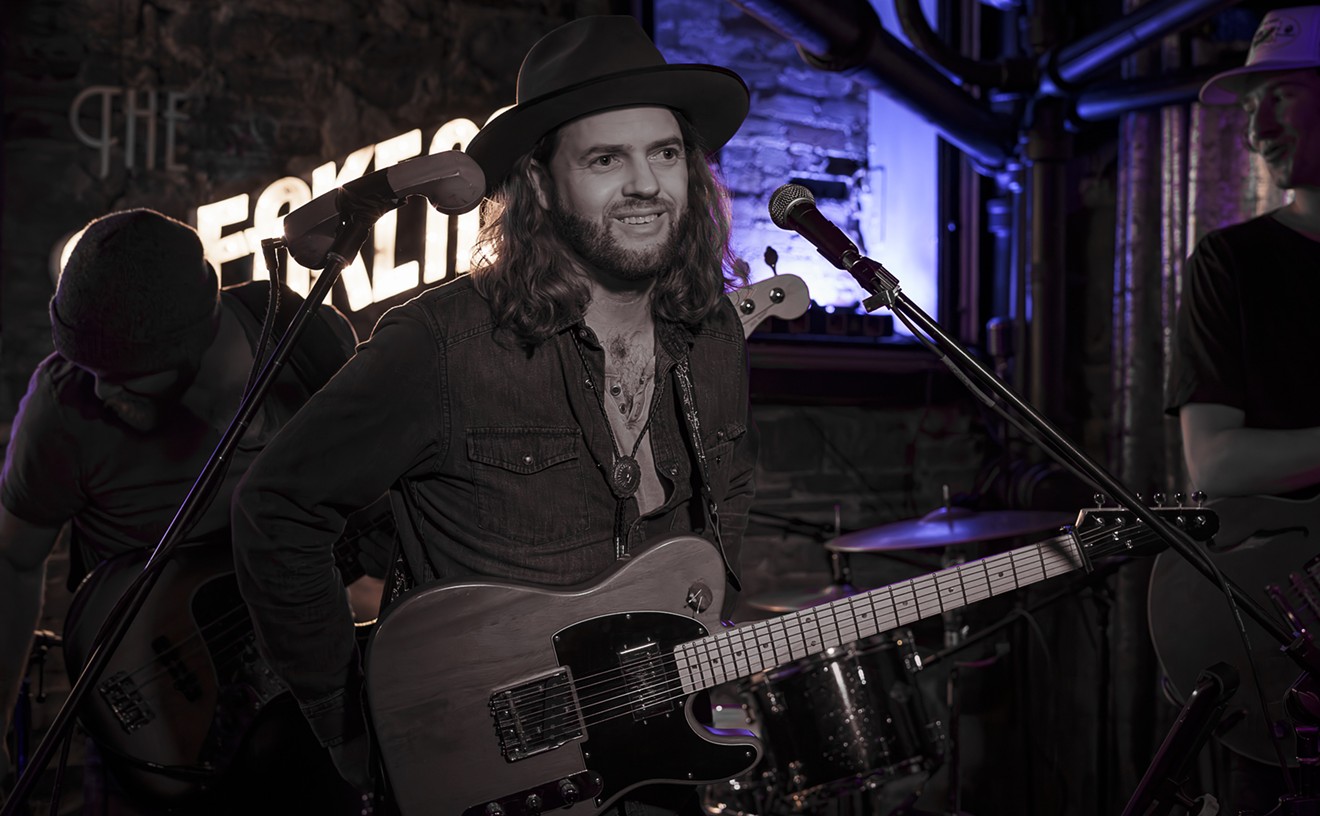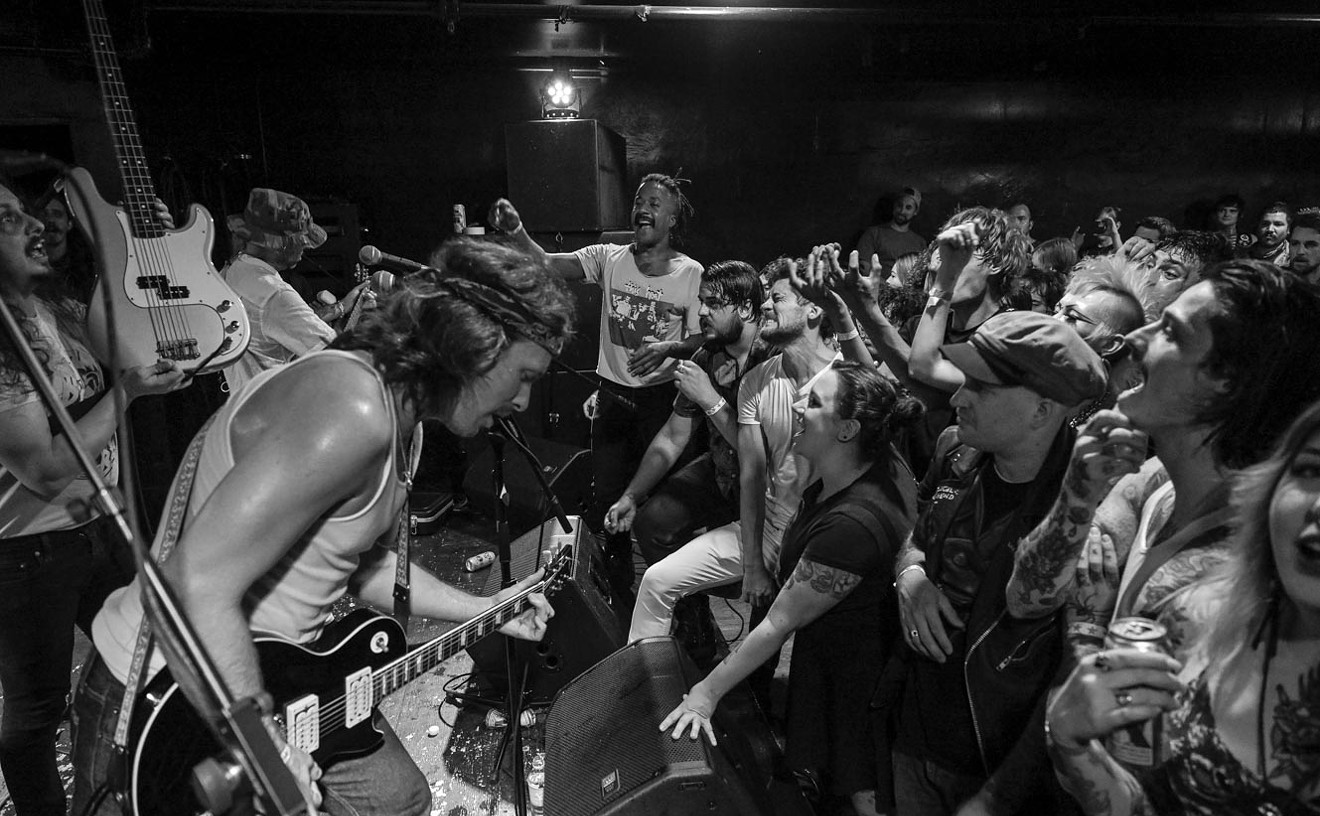"I think people will always have the desire to expand their consciousness, and I think some people feel like the only way you can see God is through LSD," he says. "And if that's their thing, I'm not going to stop them. I'm not against that, but it's not my bag. I think it's a shame."
There's no denying, however, that VAST offers an emotional onslaught, and not only via colored lights and pretty pictures at live shows. The act's self-titled debut CD has the same effect, figuratively placing listeners in an elevator that starts deliberately but quickly gathers steam. "Touched," VAST's successful lead single, is a case in point. The introspective textures that introduce it soon give way to a glass-shattering cry from the darkness courtesy of a sample of a Bulgarian women's choir. Then the drums explode onto the scene, transforming VAST's slow-but-steady lift into a speeding rollercoaster.
Accompanying barrages like this one are lyrics that frequently touch upon Crosby's deep religiosity. But in spite of lines such as "Jesus Christ, are you the savior of the world?/I want to see, but I still believe" (from "I'm Dying"), Crosby sees no reason why VAST albums should be filed in the Christian bin at your neighborhood record store. "I kind of want people to judge me on my music, because that's what I'm selling," he notes. "And I don't want to sell my spirituality, because I think that's wrong. I don't want to make money from it. I want to keep the lines separated."
So why does Crosby bother to sing about such topics at all?
"I never viewed singing about spirituality as something that's that different," he replies. "It seems like all the bands that I like do to some degree. And I also think that if you go to the Metropolitan Museum of Art, every piece of art is inspired by religion. And I think to be an artist trying to express how you feel about reality or about life, love, loss or anything and to not sing about faith or religion, you're kind of beating around the bush. It's like denying a huge part of who you are."
A native of Humboldt, California, Crosby received his first break in the music business when he was just thirteen, after a demo tape he'd sent to the president of Shrapnel Records earned a mention in Guitar Player magazine. Before long, he was receiving letters from music fans in Russia and other far-flung locations even as he was being ostracized by fellow students at school for being a long-haired guitar geek. But he persevered, and over time his style evolved from the progressive-rock fusion and neoclassical potpourri of his youth to the eclecticism that marks his approach today. According to him, "I'm always going through different phases, listening to different music"--including discs by artists as disparate as Joe Satriani, Dead Can Dance and Rage Against the Machine. Even more exotic is his latest favorite source of keyboard samples: world music.
"People tend to feel like I went into some remote or abandoned record shop in the middle of nowhere and dug through dusty attics full of old recordings to find these things," he says, chuckling. "But if you go into any music store, they usually have a world-music section or a new-age section, and you can really listen to some interesting shit. I mean, I was listening to world music, exploring it without any intention to use it, for a long time--for about a year, from nineteen to twenty. I was listening to it because I was fascinated by how different it was and how pure it was. A lot of times it's not written for any kind of commercial intention at all. It's old--it's religious, ritualistic, ceremonial music.
"One day I bought this Tibetan music," he recalls, "and they had all these really ritualistic things, and at the end there was this horn thing, and it was crazy. And so I started playing. I was walking around with my acoustic guitar, and I played over it, and I went, 'That sounds totally different.' And so I kind of hit on it. And I started listening to more and buying more, and then one day I had a little drum-machine beat going on and some chords for 'Touched,' and then I sampled the Bulgarian women's choir. It was in F sharp, and my song was in F sharp. I tried it, and it fit over it, and I went, 'Wow. That's cool.'"
VAST's technologically chiseled gems have little in common with the spare acoustic sounds or nuts-and-bolts garage racket that has characterized much of Nineties rock. But Crosby stops short of claiming that VAST is on the leading edge of a new trend. "I think the first band to do that would probably be Radiohead," he says. "I think they're the band that's led the way for what I think I'm doing in a sense, because people want to hear something a little bit more intense than just simple three-chord things. I think that you can do anything, though, and it will catch people if it's good. I don't get afraid when I see music on the charts completely different from what I'm doing, because I know that I'll get whatever success I need if I'm good enough--if I'm continuing to grow.
"People talk about pop and stuff, but the truth of it is, popular music isn't pop," he goes on. "The biggest-selling record of England is Dark Side of the Moon--it's not the Spice Girls. So I think people ultimately want to hear art. That's what will always be the biggest thing."
VAST, with special guest. 8 p.m. Monday, March 15, Bluebird Theater, 3317 East Colfax Avenue, $7, 303-830-6700.










